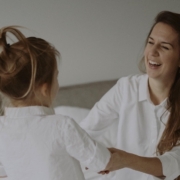Four Tips to Sensitively Say ‘No’ to Children. Part 2 of 2
Introduction
Parenting is one of the most important jobs on the planet. Attachment theory research reveals that when parents attune to their children well, kids grow up with a secure attachment style. They are more likely to choose nurturing romantic partners, be emotionally and physically healthier and more successful.
The first three years of life impact a child’s development the most. The attachment style of a one-year-old predicts the attachment style of a 21-year-old.
When a parent hasn’t applied the healthiest of parenting skills, their child may develop an insecure attachment style. If that’s your situation, it’s not the end of the world. You can still learn how to connect well with your child. You can learn to set healthy boundaries so your child can experience a secure attachment style.
Note: If your parents did not know how to emotionally connect with you, there is hope. You can develop “an earned secure attachment style” with a good round of therapy.
OK, so on with the story …
The following question arose from a discussion in our weekly Highly Sensitive Person Resilience Group.
How does a parent decline a child’s request without leaving the child feeling rejected?
Here’s the response from a mother in our group.
Each one of my three kiddos (boys 17 and 13 and one girl age 4) are very different. I communicate with each of them on their own level, but the base is the same. I consistently remind myself to respond from a mindful space where I can be compassionate, patient and understanding.
Just this week, my 13-year-old son asked me if I would give him permission to skip school because he thinks school is stupid. He said that his friends’ parents do it all the time. My knee-jerk reaction was to raise my voice and spat off something like, “Are you seriously asking me this right now? NO!”
Thankfully, I didn’t react.
1. I stopped and took a few deep breaths to calm myself. Being mindful of each inhale and exhale helps me be compassionate and understanding.
2. I gave my son my full attention. I gave him a chance to talk about why he wants what he wants. I wanted him to know that what he had to say was important to me.
I said in a calm voice, “Let’s talk through this. Tell me more about why you want to skip school this week.” I gave him a chance to talk.
3. I listened attentively. I reflected back to him what I heard to make sure that I understood him. I empathized and made good eye contact with him. He felt like I heard him.
4. I calmly educated my son so that he understood why I said “no.” This is something I did not get from my parents when I was a child. Their reason was always, “Because I said so.” I often found myself yearning to understand and thirsty for their guidance.
This same son came to me this past weekend asking for a souped-up golf cart. His father and I are divorced, and apparently, he had been driving one while with his dad last weekend. He was pretty determined to get one, so he was trying to sell me on the idea. Once again, I found myself in another opportunity to practice mindfulness, to be calm, patient and listen. I reflected back to him what he was saying and sought to understand him and his needs. I educated him about money and how it does not grow on trees, yet I was still empathetic.
Conclusion
When I say “no” to my children, I want them to feel that I care about them and respect them. I want to build their self-esteem. I take myself to a mindful space, and give the children my utmost attention. I listen, listen, listen. I reflect back what they say so that they know that I am listening. Sometimes I offer a little appreciative inquiry and, of course, I empathize with them.
I am a work in progress. There are times when I’m spent, low on patience and I fail to respond in this manner. When I fail, I feel extremely guilty and I apologize. Being a parent is one of the most heart-tugging yet joyful areas of my life. I wouldn’t trade it for anything! Being a parent has also been an opportunity for much growth and healing in myself.
May you be richly blessed!
Jeannie
*** ***
Contact Benita Esposito if you would like help to create healthy relationships and heal emotional wounds. Ask for a complimentary 10-minute get-acquainted session.
Choose from individual spiritual counseling and life coaching. Or you might like to participate in a Highly Sensitive Person Resilience Group.
Highly Sensitive Person (HSP) Retreats are available online or in-person.
Bestselling author of The Gifted Highly Sensitive Introvert: Wisdom for Emotional Healing and Expressing Your Radiant Authentic Self – available on Amazon.
Benita A. Esposito, MA, “Chief Trail Guide,” for Highly Sensitive Introverts on the Hero’s Journey to the Authentic Self. Life Coach and Spiritual Counselor.






Leave a Reply
Want to join the discussion?Feel free to contribute!